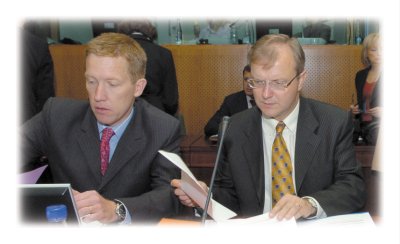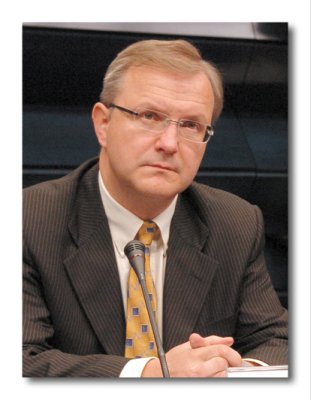| OLLI REHN | Member of the European Commission, Responsible for Enlargement |
|
NOT THE BORDERS SHOWS THE EUROPE BUT THE VALUES.. |

 But this is not a one-off event. In its half-century of existence, the Union expanded five times, and this process will continue. The decisions taken at the end of 2004 to start accession talks with Turkey and Croatia are clear evidence of that. I hope that by the end of my term as Enlargement Commissioner in 2009, many other countries in this region will have moved closer to the European Union. My goal is that in 2009 the EU will have about 27 members, with the Western Balkan countries – including of course Serbia and Montenegro – well on their way to the European Union, as well as Turkey on track, through rigorous reforms. Enlargement is one of the EU's most successful policies. The Union has progressively extended its zone of peace and democracy across the European continent. Following the entry of 10 new members last May, the EU stretches from the Atlantic to the Carpathian mountains, and from northern Lapland down to the coast of the Levant in the eastern Mediterranean. I am often asked where Europe's ultimate borders lie. My answer is that the map of Europe is defined in the mind, not just on the ground. Geography sets the frame, but fundamentally it is values that make the borders of Europe. Enlargement is a matter of extending the zone of European values, the most fundamental of which are liberty and solidarity, tolerance and human rights, democracy and the rule of law. According to the EU’s treaties – which are its legal basis - the Union’s doors are open “to all European states which respect its values and are committed to promoting them together”. But the established conditions for accession go beyond the treaty provisions. There are four prime criteria that a country must meet in order to win the acceptance of the European public and governments.
First, a country must have a European vocation, as measured by the will of its own people to join. The Turkish people seem to have this vocation while the Norwegians seem to lack it, even though Norway could meet most of the other criteria today.
But this is not a one-off event. In its half-century of existence, the Union expanded five times, and this process will continue. The decisions taken at the end of 2004 to start accession talks with Turkey and Croatia are clear evidence of that. I hope that by the end of my term as Enlargement Commissioner in 2009, many other countries in this region will have moved closer to the European Union. My goal is that in 2009 the EU will have about 27 members, with the Western Balkan countries – including of course Serbia and Montenegro – well on their way to the European Union, as well as Turkey on track, through rigorous reforms. Enlargement is one of the EU's most successful policies. The Union has progressively extended its zone of peace and democracy across the European continent. Following the entry of 10 new members last May, the EU stretches from the Atlantic to the Carpathian mountains, and from northern Lapland down to the coast of the Levant in the eastern Mediterranean. I am often asked where Europe's ultimate borders lie. My answer is that the map of Europe is defined in the mind, not just on the ground. Geography sets the frame, but fundamentally it is values that make the borders of Europe. Enlargement is a matter of extending the zone of European values, the most fundamental of which are liberty and solidarity, tolerance and human rights, democracy and the rule of law. According to the EU’s treaties – which are its legal basis - the Union’s doors are open “to all European states which respect its values and are committed to promoting them together”. But the established conditions for accession go beyond the treaty provisions. There are four prime criteria that a country must meet in order to win the acceptance of the European public and governments.
First, a country must have a European vocation, as measured by the will of its own people to join. The Turkish people seem to have this vocation while the Norwegians seem to lack it, even though Norway could meet most of the other criteria today. Accession requires a concerted effort over many years, so political leaders must ensure their population broadly backs the enterprise. Joining the EU changes a country. It becomes part of a larger community, which affects its domestic laws and institutions. Elites alone cannot ensure the legitimacy of this decision; it must be backed by the citizens.
For this reason, civil society is an essential part of the process of joining the EU. You have a big task ahead, which is to explain to your fellow-citizens what EU accession is really about. It is not just a matter of politicians signing a deal, or technocrats deciding on a few legal changes. No, joining the EU is about changing the whole political system and legal order, which affects the whole society. This process of transformation has to work from the bottom up as well as the top down. The Union is not a military alliance like NATO nor an international talking-shop. Instead, it is a community of common policies, a community of law and a community of values.
The second pre-condition is that any prospective member must respect European values and, most importantly, be able to live up to them. This concerns particularly the rule of law in all spheres of life. Key issues here are rooting out corruption and organised crime, as well as respecting and protecting minorities.
Countries that are to join the EU have to live up to their international obligations, including to locate and transfer war criminals and fully cooperate with the Tribunal in The Hague. This is an essential condition for progress on the road towards European integration. This concerns several countries in the Western Balkans. This means that Croatia must fully cooperate with the Tribunal before we can start accession negotiations. Bosnia and Herzegovina must continue to improve their track-record before making further progress on pre-accession. And Serbia and Montenegro must deliver on their international obligations. The EU is a community of law, not power. Big and small states live side by side in the EU, and all peoples should be respected. Instead of balance-of-power politics, the rule of law governs the internal and external business of the European Union. It is a community of states that have agreed to pool their sovereignties and obey common laws in order to increase their impact in the world. This principle of rule of law also has to be adopted by any state which seeks to join the EU.
Accession is about taking European values into the fabric of daily life. ‘Values’ sound rather vague, but they are spelled out clearly in the EU’s new Constitutional Treaty. They include democracy, the rule of law, respect for human rights, and the protection of minorities these are fundamental pre-conditions for closer relations with the EU. To implement them, candidate countries have to ensure these values are respected throughout society – so that police officers respect human rights at every arrest, for example, that judges are impartial, that teachers don’t discriminate against children of different ethnic origin, and that soldiers obey the rule of law. In Serbia and Montenegro, it is the academics, the activists, the intellectuals and the religious associations who need to lead the debate on European values, to ensure that the people in your country know what the EU is really about. You also have to keep your country’s politicians up to the mark, so that everybody in Serbia and Montenegro knows what the politicians have to do in order to get to EU membership. Fundamentally, they have to choose between a nationalist past and a European future. The third pre-condition is that all members must be able to carry the duties of membership, not just its benefits. Potential joiners have to show that they have the administrative capacity to apply EU rules properly, and the political will to do so. They also need to have a functioning market economy and the capacity to cope with competitive pressures within the EU’s internal market. For Serbia and Montenegro, EU membership is a realistic and valuable goal, certainly worth the effort required. EU membership means better rights for citizens, better economic prospects and living standards, and better neighbourly relations and regional cooperation. The next step will be to open negotiations on the Stabilisation and Association Agreement, which paves the way for accession negotiations proper. It is now up to Serbians and Montenegrins to clear away the hurdles of the past, and to move on to realise their future in Europe.
An essential part of the Stabilisation and Association Process is regional cooperation. The economies of the Western Balkans are small, so regional cooperation is essential for economic development. This can be best achieved in the European framework, with the legal certainty provided by EU rules. Regional cooperation is vital to attract foreign investment. The creation of common energy networks, for example, would boost economic development. The European Union is financially assisting countries on their road to Europe. However, best use of this assistance depends on actors on the ground being ready to play their part, and take the initiative to start productive and useful projects.
The creation of wealth and jobs depends ultimately on entrepreneurship and innovation, which can be facilitated but not dictated by the EU. In my view, it is very important to improve the procedures faced by Serbians and Montenegrins when they apply for visas to visit the European Union. This is a citizens’ Europe. I have talked with my colleague Franco FRATTINI, a Vice-President of the Commission, and we are working together on concrete proposals to pave the way for better visa procedures. Of course, visas are issued by the individual Member States’ embassies, and they are the ones who ultimately decide how they interpret the rules. But we will do the best to improve the rules on our side.
However, remember that their willingness to do this – and the pace of progress on visas – depends on the pace of reforms that this country makes in improving its border control systems and fighting against organised crime and corruption. Regional cooperation, or regional integration, is not something new – it is the founding principle of the EU. When Jean Monnet and other visionaries originally worked out the idea of European integration, they pursued to voluntarily integrate the economies of Europe so tightly that war between them became unthinkable. The economies of Europe at that time were also rather small, like the economies of this region. Thus, Monnet and his fellow founders of the EU worked on linking energy markets and liberalising trade to foster regional integration and to build it in practical terms. That is the germ of the EU’s success, that people work together on concrete projects in which they all have a clear interest, and then they find that they rely on each other and trust each other more. Jean MONNET called it “la solidarité de faits” – the ‘solidarity of facts on the ground’. That kind of solidarity – which starts off as physical but becomes mental and intellectual – is what I want the EU to help you to build in this region, and in this country.